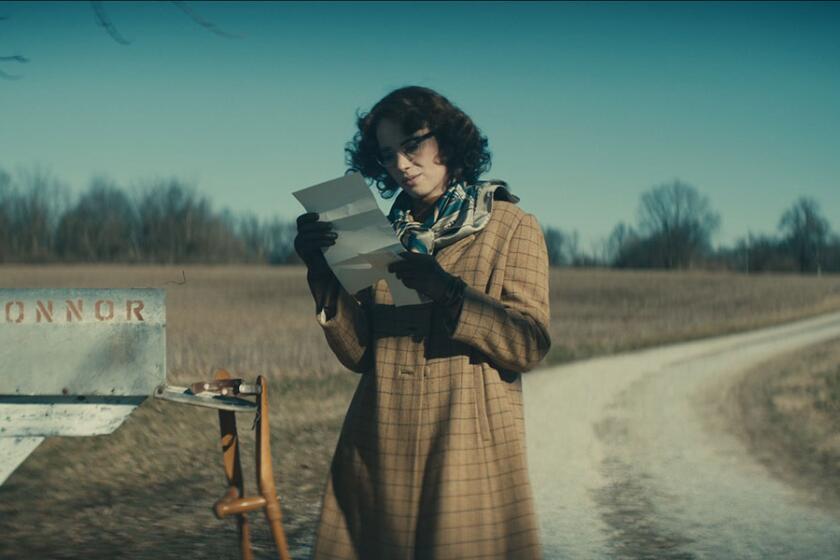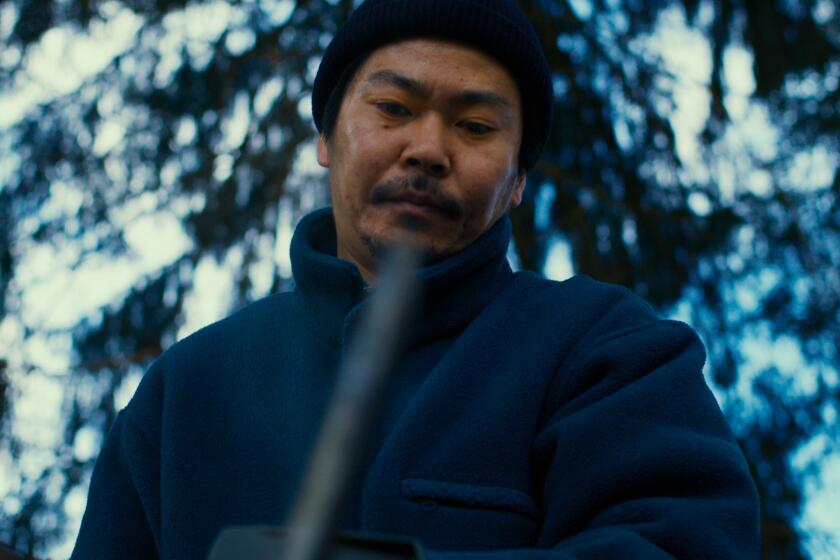Book review: ‘Drama: An Actor’s Education’ by John Lithgow
Difficult to place, impossible to ignore, John Lithgow is like a walking Al Hirschfeld caricature of a thespian. On stature alone, this 6-foot-4 character actor demands to be seen. His diction has that elevated tone that suggests he’d rather be speaking in iambic pentameter. And his natural eccentricity, that quality that keeps getting him cast as serial killers and high-toned freaks, seems to only increase with attention.
One could be forgiven for assuming that this consummate stage creature hails from a distant planet, not unlike the character he played for six seasons on the TV sitcom “3rd Rock From the Sun.” But Lithgow has now written a memoir explaining his uncommon pedigree. “Drama: An Actor’s Education” is his highly articulate account of his upbringing in the American theater, the story of a provincial impresario’s son, who, nurtured backstage on Shakespeare and Shaw, eventually found a place for himself in the national spotlight acting in a less lofty but no less flamboyant vein.
What you see is no affectation. Lithgow is to the histrionic manner born. His father, Arthur Lithgow, was an actor, producer, director and Shakespeare missionary. He packed the family into his black Studebaker and improbably tried to establish theater festivals across the country. Lithgow and his siblings, perpetually the outsiders, had no choice but to put a smiling face on their rootlessness. They changed schools the way other kids changed fall wardrobes. Each new city introduced them to a new community, compelling them to quickly pick up the local lingo and more or less bluff their way into belonging.
For a precocious boy like Lithgow, who had a walk-on appearance in Ibsen’s “A Doll’s House” at an age when most kids are still banging together blocks, this itinerant childhood turned out to be ideal acting training. So too was the opportunity to perform in bit parts as an adolescent at the Akron Shakespeare Festival, where the classically trained British actor Donald Moffat made a theatrical convert out of a lad who had been leaning more toward the visual arts than the stage.
Life changed rapidly after Lithgow’s father took a position at New Jersey’s McCarter Theatre, where he quickly rose to become the artistic leader. Lithgow attended Princeton High School for his junior and senior years, and he thrived in his new environment, becoming an academic overachiever, student council president and extracurricular dynamo, all the while taking advantage of the cultural offerings at his father’s place of employment.
Not even Harvard College could resist the bursting résumé of this distinguished young man, whose older self acknowledges that his “desire to please verged on the pathological.” The exhausting list of his teenage endeavors reflects both a remarkable industriousness and a powerful need to sublimate, qualities that were no doubt modeled after his father. In a telling anecdote, he recalls working on a woodcut within an hour of arriving at his freshman dorm, barely stopping to acknowledge his roommate, David Ansen, who would become a lifelong friend and, in due course, Newsweek’s longtime film critic.
“Who was that strange boy?” Lithgow self-interrogatingly inquires. He examines his undergraduate years among the elites and soon-to-be-famous as though following the pursuits of a psychologically unformed though cheerfully indefatigable character. Naturally, he was a mainstay of Harvard’s theater scene, deciding to commit to acting (while continuing to direct and occasionally design sets) after feeling the ecstasy of a rampaging ovation for a giddy Gilbert & Sullivan ensemble number. An inveterate multi-tasker, he got married before his senior year (an act that seems to bewilder him as much as that woodcutting scene), graduated magna cum laude and won a Fulbright grant to England, where he’d acquire another layer of polish and plumminess.
Up to this point, the memoir reads like a series of quaint reminiscences about an accomplished youngster whose calling was right in front of him along. “Drama,” which proceeds for an extended time at a moseying clip, lacks the soul of drama — conflict. There are challenges along the way, to be sure, most of them involving a theatrical neophyte in over his head who usually manages to triumph over long odds. But the inner struggle is subordinated to the external show. The vagueness of Lithgow’s younger self makes the journey slightly plodding in the early going. It’s only when the source of that vagueness — Lithgow’s relationship with his father — is confronted head-on that the book’s eloquence acquires depth.
For those who saw “Stories by Heart,” the solo piece Lithgow brought to the Mark Taper Forum earlier this year, the book’s opening scene, in which he helps his elderly father convalesce through the reading of family favorite short stories, will certainly be familiar. “Drama” sets out to understand this formative relationship more fully, but the exploration is hampered at times by the need to protect a father’s legacy.
Why, for instance, does Arthur Lithgow, who has certainly earned his place in the American theater almanac, keep getting dismissed from jobs? That’s not an easy question for a son to answer. Lithgow attributes it to the vagaries of a life in the theater, his father’s penchant for biting off more than he can chew and the difficult acknowledgment that there was a higher level of professional excellence elsewhere. This latter insight emerges only after Lithgow accepted that he didn’t want to settle for the safety of steady acting and directing work at his father’s company a few years out of college. It would be New York or bust for this ambitious young actor who was as professionally overprepared as he was emotionally underprepared for the rocky road ahead.
The book, which leaves off shortly after Lithgow becomes an established Broadway presence in the 1970s, pauses now and again to offer lessons to aspiring actors. These are judicious, well-phrased and largely banal. There are also prose valentines to four talents — José Quintero, Mike Nichols, Meryl Streep and Bob Fosse — whose artistry has left a lasting impression on him. In the juiciest tidbit, Lithgow reveals he had a complete meltdown during a tempestuous affair with actress Liv Ullmann. This adulterous romance with a costar, one of many in the period the author dubs his “late adolescence,” brought his teetering first marriage to an end and forces him to delve into the inner workings of his character, not in the outward manner of a classically trained British performer adjusting his accent and wig but in the psychoanalytic jackhammer mode of a Method actor desperate for unvarnished truth. He rises to the occasion with courageous honesty and fairness.
Long settled in Westwood with his second wife, Mary Yeager, a professor at UCLA, Lithgow has tamed the chaos that since his childhood must have seemed inseparable from a life in the arts. The awards have piled up and, happily, his prodigious creative industry shows no signs of slowing down. But there’s something breath-catchingly poignant in the simple, hard-won wisdom he imparts before taking his final bow: “Acting is pretty great. But it isn’t everything.”
More to Read
The biggest entertainment stories
Get our big stories about Hollywood, film, television, music, arts, culture and more right in your inbox as soon as they publish.
You may occasionally receive promotional content from the Los Angeles Times.







